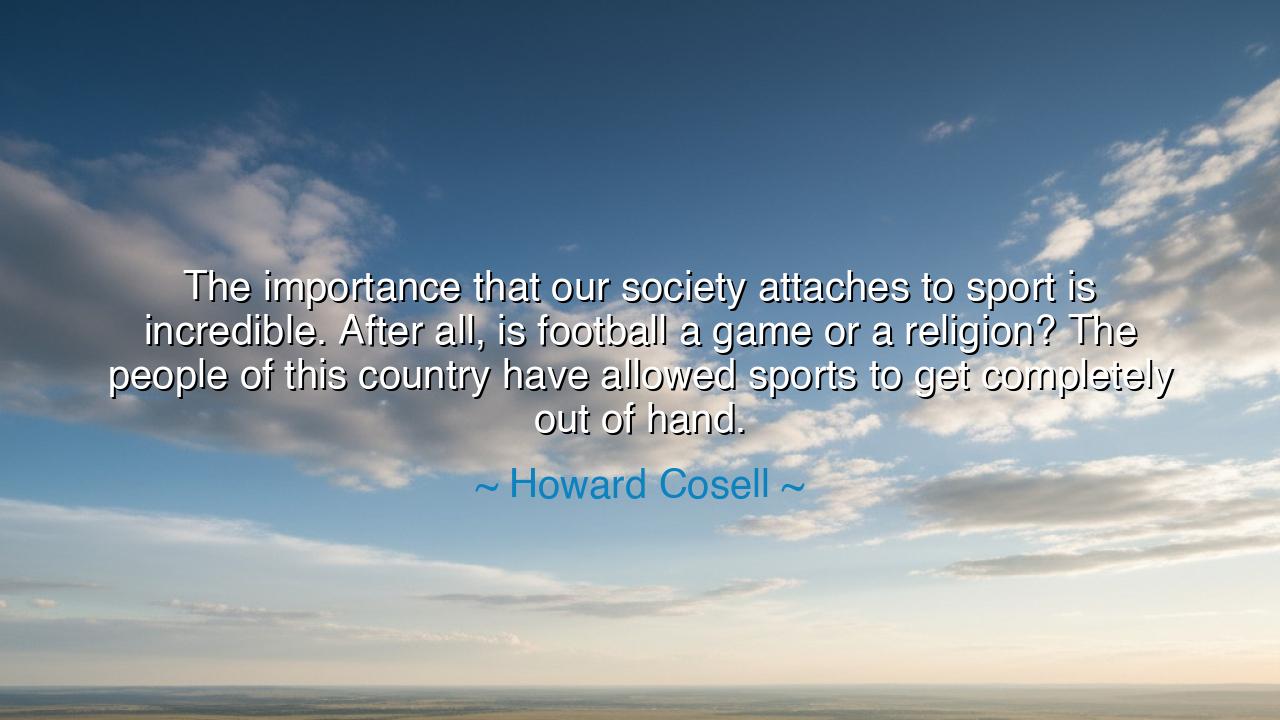
The importance that our society attaches to sport is incredible.
The importance that our society attaches to sport is incredible. After all, is football a game or a religion? The people of this country have allowed sports to get completely out of hand.






The renowned commentator Howard Cosell once reflected with both insight and critique: “The importance that our society attaches to sport is incredible. After all, is football a game or a religion? The people of this country have allowed sports to get completely out of hand.” In these words, we hear not only the voice of a journalist but the voice of a philosopher observing the follies of mankind. Cosell recognized that sport, meant to entertain and inspire, had grown into a force that commanded devotion rivaling the sacred, shaping identities, communities, and even national passions with intensity and zeal.
This quote reveals a profound observation about the sociology of sport. Cosell saw how people invest emotion, time, and resources into games that, in essence, are contests of skill and chance. Yet society often elevates these contests to a form of ritual, where allegiance becomes faith, and victories and defeats affect moods and behavior far beyond the field. In calling football nearly a “religion,” he warns us that devotion, when unchecked, can distort priorities and warp judgment.
History bears echoes of this phenomenon. In ancient Greece, the Olympic Games were not mere sport—they were a sacred festival, dedicated to the gods. Citizens would travel great distances, offering sacrifices, and entire city-states paused their rivalries to honor competition. While noble in intention, even in those times, devotion sometimes overshadowed reason, as city-states measured pride and identity in the success of athletes. Cosell’s reflection suggests that modern society has replicated this pattern, often without reflection.
The meaning of his words also highlights the danger of imbalance. When society allows sports to “get completely out of hand,” attention and resources can be diverted from vital pursuits such as education, civic engagement, and the arts. The thrill of competition, while inspiring, can dominate discourse and identity, making it difficult to distinguish between recreation and obsession. Cosell’s critique is thus a call to temper passion with perspective, to admire athletic feats without surrendering the broader values of life.
Consider also the example of the 1969 “Miracle Mets”, whose improbable victory captured a nation’s heart. While inspiring and celebratory, Cosell might remind us that such events, magnified by media and fervor, can eclipse attention from social and political crises. His insight warns that while sports can unite, they can also distract, creating a society where the worship of spectacle eclipses the cultivation of civic wisdom.
The lesson from Cosell’s words is timeless: enjoy sport for its drama, beauty, and lessons in perseverance, yet never allow it to dominate your life or society’s priorities. Cultivate awareness of the line between admiration and obsession, between celebration and idolatry. Practical actions include engaging critically with media, balancing leisure with learning, and remembering that true fulfillment arises from community, purpose, and reflection, not solely from victories on the field.
Thus, Howard Cosell’s quote stands as both warning and wisdom. It teaches that while sport is a source of joy, inspiration, and unity, it must remain in balance with the other sacred pursuits of human life: knowledge, virtue, and compassion. Let us admire the feats of athletes, let us cheer for skill and courage, but let us also remember that the altar of our attention must be shared, lest the spectacle of sport becomes a religion that consumes reason and quiets the soul.






AAdministratorAdministrator
Welcome, honored guests. Please leave a comment, we will respond soon